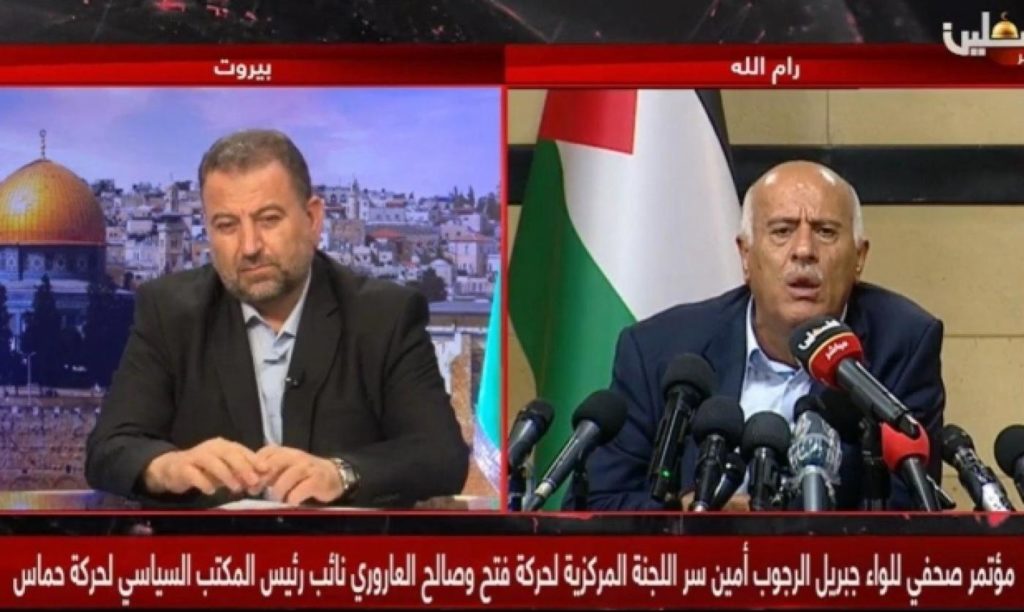Australia/Israel Review
Deconstruction Zone: An Abbas-Hamas realignment?
Jul 31, 2020 | David Horovitz

At a joint press conference on July 2, two Palestinian leaders from different factions, Fatah’s Jibril Rajoub and Hamas’ Saleh al-Arouri, vowed to work together to resist unilateral Israeli moves to extend sovereignty to parts of the West Bank and “topple” the Trump Administration’s Israeli-Palestinian peace proposal. “We will put in place all necessary measures to ensure national unity,” proclaimed Rajoub in Ramallah, as al-Arouri looked on, via video link, from Beirut.
Their coordination would open “a new phase that will be a strategic service to our people,” chimed in al-Arouri, adding ominously that Hamas would “use all forms of struggle and resistance against the annexation project.”
Had the bombshell event been organised by an internal opponent to Palestinian Authority (PA) President Mahmoud Abbas’ rule, it would have represented an outrageous act of defiance against him.
Here, after all, was one of Abbas’ most senior colleagues, a former PA preventive security chief and potential successor who once worked in close coordination with Israeli security forces, grandly declaring that Fatah was henceforth partnering with Hamas, readying to work in “100 percent harmony” with an Islamist terror organisation avowedly committed to the destruction of Israel. An Islamist terror organisation, moreover, that 13 years ago brutally forced Abbas’ Fatah out of the Gaza Strip, and would have long since finished him off in the West Bank too were he not protected by Israel’s ongoing overall security presence there.
But Rajoub’s “unity” presentation with al-Arouri – the exiled chief of Hamas’ West Bank terrorist infrastructure, and the man who orchestrated the kidnapping and killings of three Israeli teenagers in the Etzion Bloc south of Jerusalem in 2014 – was not a calculated act of defiance against Abbas.
It was, rather, a stinging blow to the lingering hopes of those on the Zionist left who, in the face of years of contrary evidence, still insistently regard Abbas as a potential peace partner with whom Israel might be able to reach a dependable peace agreement.
The Fatah-Hamas pledge of partnership declared by Rajoub and al-Arouri – who has a US$5 million American bounty on his head – was approved in advance by the PA President. The joint event was applauded on the day itself by the PA Prime Minister and shown on both PA and Hamas TV.
The message Abbas was sending – to a watching world but most especially to his own people – was unmistakable: Israel, and any possibility of reconciliation, out; Hamas, and terrorism, in.
There was never any remote chance that Abbas, who chose to walk away from then Prime Minister Ehud Olmert’s 2008 offer of almost everything the Palestinians purportedly seek – including land equivalent to 100% of the West Bank with one-for-one land swaps, and a shared capital in Jerusalem – was going to engage with the Trump Administration’s “Peace to Prosperity” proposal, with its far less generous, highly conditional framework for a Palestinian state.
Abbas, who warmly hosted President Donald Trump in Bethlehem in May 2017, made his strategy plain when he broke off all contacts with the Administration seven months later, after Trump formally recognised Jerusalem as Israel’s capital – even though the presidential recognition left open the possibility of Palestinian sovereignty there too.
The PA chief has since underlined his rejectionism in all manner of ways, many of them directly self-defeating for his people – routinely inciting against Israel and denying Jewish history in the Holy Land in order to persuade Palestinians that Jews have no legitimacy there; diverting foreign assistance to help fund salaries and payments to terrorists and their families; and refusing in recent months to accept the tax payments collected by Israel on the PA’s behalf – monies essential to pay the Palestinian workforce.
Thus when various interlocutors, reportedly including Jordan’s King Abdullah, have urged Abbas in recent weeks to thwart Netanyahu’s unilateral annexation gambit by informing the Americans he was prepared to re-engage, Abbas refused to do so, instead suspending security cooperation and intensifying the PA’s anti-Israel diplomacy.
He also submitted a “counter-proposal” to the Middle East Quartet – a forum comprising the US, EU, UN and Russia under whose aegis Israel has always refused to negotiate – for a demilitarised Palestinian state. But any credibility in this counter-proposal, whose full details have not been publicised, has now been superseded by his new alliance with Hamas.
Plainly, the Trump Administration can put aside any thought of the Palestinian leadership engaging with its Peace to Prosperity vision, notwithstanding US officials’ intermittent assurances that the proposal’s terms are not final, and that the goal is for the Palestinians to come back to the table, where they could propose changes.
And we wait to see how much freedom of operation Abbas intends to give to al-Arouri and his murderous acolytes, or rather how much they will now seize – whether, that is, Israel now faces a new wave of terrorism in and from the West Bank.
David Horovitz is the founding editor of the Times of Israel. © Times of Israel (www.timesofisrael.com), reprinted by permission, all rights reserved.
Tags: Fatah, Hamas, Palestinians






